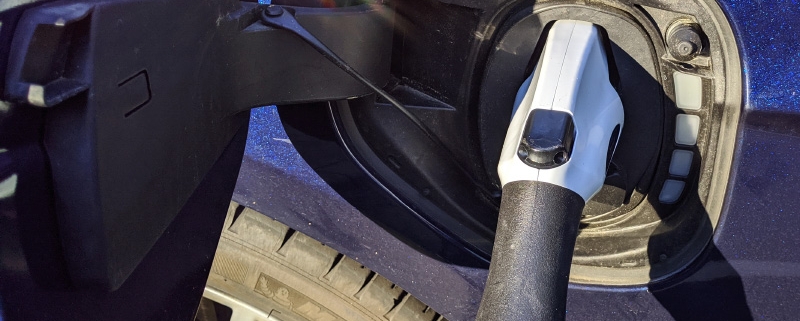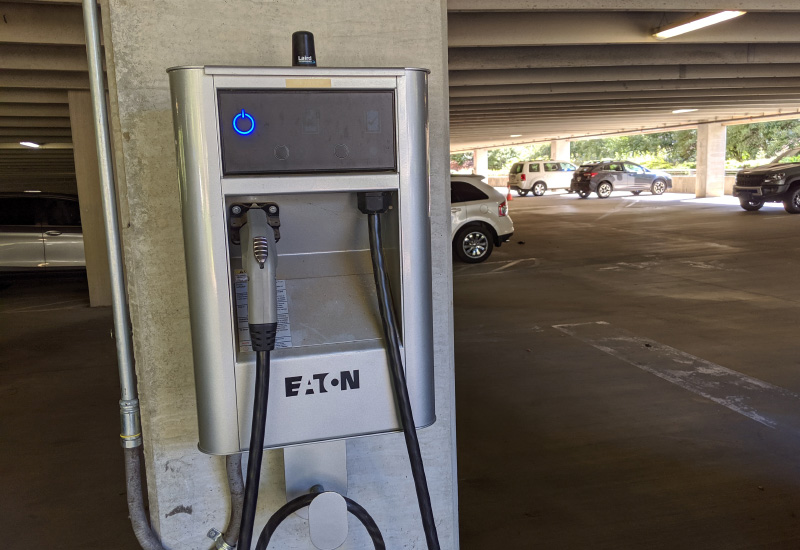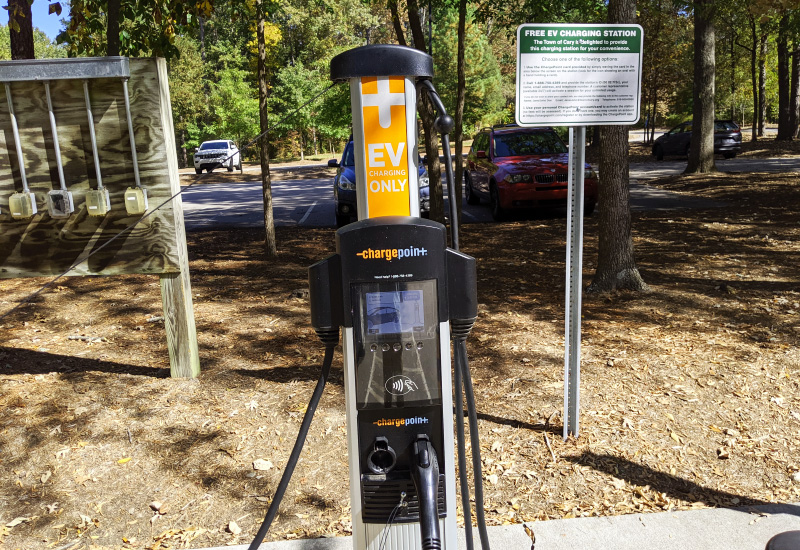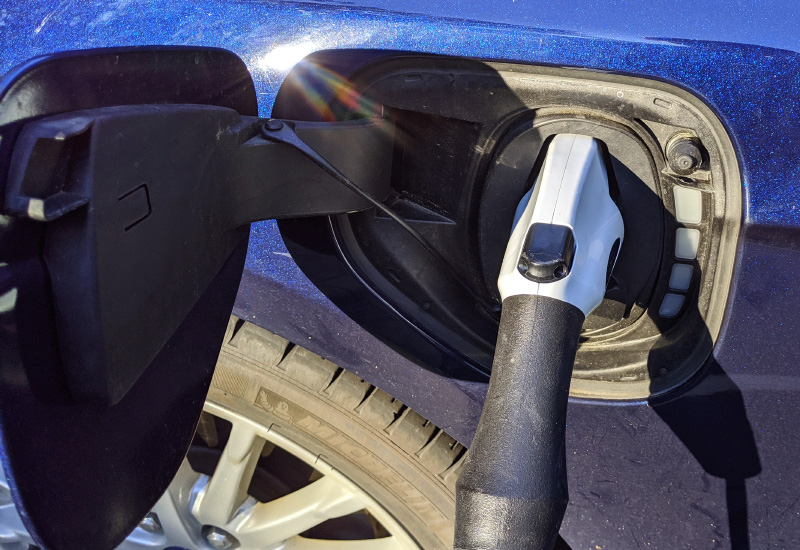Owning an Electric Car in Cary
Cary, NC – Not only are electric cars becoming more common in North Carolina but the infrastructure for them is growing as well, with Duke Energy announcing a plan earlier this year to invest $76 million in charging stations. So, for Cary drivers thinking about getting an electric car, what are some factors to consider?
Cary’s Electric Car Infrastructure
As more people start buying and driving electric cars, more charging stations open up. The Target in Crossroads Shopping Center recently renovated part of its parking lot for several charging stations and various offices and businesses in Cary such as SAS have charging stations for employees.
But while many of these are paid charging stations, the Town of Cary has installed and operates several free ports, each with their own benefits and drawbacks. All of these stations are “Level 2” charging stations, with between 220 and 240 volts. This is contrasted with Level 1 charging at 110 volts, which you would get from plugging a car into an ordinary electrical socket and Level 3 charging at 480 volts (Level 3 charging can typically recharge 80 percent of a car’s battery in half an hour, though this can significantly weaken the battery life).
The most popular and easiest to use of Cary’s free car charging stations is in the Downtown Cary parking deck across from the Herbert C. Young Community Center. The two ports attach and detach without any registration or interaction with WiFi and are easy to spot right at the parking deck’s entrance. Also, with the several hours of charging needed at this station, its Downtown Cary location makes it convenient since it is walkable to not only Town Hall but the rest of downtown. However, one drawback is its convenience and location makes it the most popular spot as well and spots are often occupied.
There is also a charging station downtown at the Cary Arts Center. However, it is linked to GE’s WattStation charging network. Both WattStation’s website and mobile app are poorly designed to the point that they are essentially unusable, making this charging station just as ineffective.
Cary also operates a free charging station with two ports at the Bond Park boathouse. To access this, drivers will need a ChargePoint account but it does not take any money. Also, as a ChargePoint station, it also gives drivers a readout of how long they were charging and how much electricity they used. Because of its location, it is not as walkable as Downtown Cary but this also means it is less used and it is useful for anyone visiting Bond Park and its various trails.
Finally, there is the charging station at Cary’s solid waste treatment facility on James Jackson Avenue. This site is primarily meant for Town of Cary electric vehicles and is typically being used to charge those cars. Also, these lots are specifically off-limits to the public on evenings and weekends. In total, this is not a practical choice for Cary drivers.
When the new parking deck connected to the Cary Regional Library opens, this will offer more charging options as town staff say there will be between 12 and 14 ports.
Other Advice for Electric Drivers
Right now, electric vehicles are undergoing a lot of change and the landscape may be radically different in five years from where it is today, just as five years ago most people may have only associated electric cars with the Tesla, when many car companies now offer electric varieties.
While battery range is still a limitation for many prospective electric car buyers, Cary is nicely situated near several destination centers that are well within range for a typical electric car.
Electric vehicles also require much less maintenance than a traditional fuel car because of the relative simplicity of its engine. Also, because electric vehicles are so new, warranties on these cars are often generous, which is especially helpful given the cost of the battery.
But in a suburban community such as Cary, one thing any driver should consider is the silence of electric vehicles. A pedestrian or a pet can easily not hear a car coming in a tight neighborhood or downtown and if the driver is not aware of this or diligent, it can lead to a serious accident.
Story and photos by Michael Papich.







Where I park my Leaf in Durham at the Tobacco Campus they had to start charging for the electricity. Not because the cost of the electricity (about $.50/hour for newer 150 mile Leafs). But because people hogg the good parking spaces if you don’t charge money!
Cary citizens benefit from zero tailpipe emissions from electric vehicles. As we switch from inefficient gas guzzlers, to efficient plug-in electric vehicles, we will all benefit from the lack of need for polluting gas stations and fossil fuel infrastructure. We have driven a Nissan Leaf for 6 years, and their range and performance improves each time we go back for a new lease deal. We primarily charge our vehicle at home in our garage. We don’t miss having to wait at the service station for oil changes and other engine services. Also, the regenerative braking the brakes don’t need to be changed as often. Save money, time and improve your health and the health of your community by switching to an electric vehicle.
Just a note from an old Coast Guard Engineman. An electric motor converts electrical energy into mechanical energy while an engine converts combustion heat into mechanical energy. Thus, an EV does not have an engine. Now we can all laugh, All in all, it was a good article. Thanks.
Yes Solar Solutions in downtown Cary was the first Tesla certified EV charging installer in NC and also installs Chargepoint chargers. We can provide free estimates to new EV customers.
It costs money to purchase electricity and set up charging stations — costs which I assume are borne by Cary taxpayers. Cary taxpayers, therefore, ought to be informed how much this “free” service costs and why the actual beneficiaries (those who own electric cars) are not paying for it themselves.
“…why the actual beneficiaries (those who own electric cars) are not paying for it themselves…”
This kind of thought process really needs to stop, that’s not how living in a society works.
You are the beneficiary of “The Town of Cary”, including ALL of the services it provides.
I don’t get to ride the free GoCary buses from my front door to wherever I’m going (because I’m not physically disabled or over 60 years old), but if everyone that wasn’t an “actual beneficiary” had the option to take back the pennies a year from their tax bill that went to that part of the GoCary service, then the Town would be a lesser place because of it.
We pay taxes, the town spends them. We don’t get personal line-item vetoes on electric chargers or specific art installations or whether this or another park gets planned. In recent history, the Town has done a good job spending those taxes in a mostly productive way. People seem to agree, since we’ve been growing by thousands of people a year for the past couple of decades; and financial institutions also seem to agree, since the interest they charge us on things like bonds is barely above the Federal Funds rate (the minimum interest that a bank will charge).
“Pay as you go by the person who receives the benefit” should always be the rule in a truly free society — except for those things which economists define as “public goods. ” Forcing all taxpayers to pay for a private benefit to electric car owners is a form of socialism. Those who believe otherwise are the ones whose “thought process really needs to stop.”
Your definition of a “free society” in this case is a textbook definition of Libertarianism. As in, the theoretical model implementation, where everything that happens in the country is only supported directly by the people that use it, and people only use the things they can provide for themselves.
For all the claims about how “Socialism” doesn’t work anywhere in the world, despite plenty of examples (running the spectrum from Communism all the way through to Democratic Socialism) to the contrary, there are literally zero countries in the world that operate on this model. That’s mainly because it’s impossible to have an actual government function this way, when every man is an island.
You don’t use the fire department, either. Should you get to not pay for it? Should then the fire department get to decide to not put out your house when it catches on fire, if you’re not paying your fire department bill?
We don’t live in the worlds of “Atlas Shrugged” or “The Moon is a Harsh Mistress”. It’s a fun academic debate, but it’s completely impractical for a society and a government to function entirely in that manner.
If you took the trouble to learn what a “public good” is, you would know that police & fire departments, as well as roads & sewers, are public goods – things that do not fall under the private benefit category. The price for creating a “successful” socialist state is the destruction of human liberty — and, even at that, there are no economically successful socialist states. If you truly believe in the efficacy of electric cars, you should also believe that people possess the wisdom to make that economic choice without obliging me to pay for their preference. Instead, you wish to sacrifice my freedom for your own personal folly and to use the coercive force of government to accomplish that. For that, you should be ashamed.